Michael Safi in Delhi
Myanmar's treatment of its Muslim Rohingya minority appears to be a "textbook example" of ethnic cleansing, the top UN human rights official has said.
In an address to the United Nations human rights council in Geneva, Zeid Ra'ad al-Hussein denounced the "brutal security operation" against the Rohingya in Rakhine state, which he said was "clearly disproportionate" to insurgent attacks carried out last month.
More than 310,000 people have fled to Bangladesh in recent weeks, with more trapped on the border, amid reports of the burning of villages and extrajudicial killings.
"I call on the government to end its current cruel military operation, with accountability for all violations that have occurred, and to reverse the pattern of severe and widespread discrimination against the Rohingya population," Zeid said.
"The situation seems a textbook example of ethnic cleansing."
On Sunday Bangladesh's foreign minister accused the Burmese government of committing genocide against the Rohingya. Analysts said that AH Mahmood Ali's language was the strongest yet from Myanmar's neighbour, and reflected intense frustration in Dhaka at the continuing influx of desperate Rohingya refugees.
Over the weekend the Dalai Lama became the latest Nobel peace prize laureate to speak out about the crisis, telling the Burmese forces involved in attacks on the ethnic Muslim minority to "remember Buddha".
Ali told diplomats on Sunday that unofficial sources had put the Rohingya death toll from the latest unrest in Rakhine at about 3,000.
The violence was triggered on 25 August when a Rohingya militant group attacked more than a dozen security sites and killed 12 people.
Militia groups, local security forces and the Burmese army responded with "clearance operations" that have forced refugees into Bangladesh and left tens of thousands more displaced inside the state.
"The international community is saying it is a genocide. We also say it is a genocide," Ali told reporters in Dhaka.
He said the influx of refugees in the past month took the total number of Rohingya in Bangladesh to more than 700,000. "It is now a national problem," he said.
Ali said about 10,000 homes had been burned in Rakhine state, a figure that cannot be verified as Myanmar has restricted independent access to the state.
Scores of refugees in Bangladesh have given accounts of arson by Burmese security forces. On Sunday Human Rights Watch said that satellite analysis had shown evidence of fire damage in urban areas populated by Rohingyas as well as in isolated villages.
Myanmar says it is targeting armed insurgents, including fighters from the Arakan Rohingya Salvation Army (Arsa), the group which claimed responsibility for the August attacks and reportedly controls small areas of Rakhine.
Arsa, which has been accused of carrying out attacks against Buddhist and Hindu civilians, called for a month-long "humanitarian pause" on Sunday to deal with the refugee crisis. The truce was dismissed by Myanmar authorities, which said they did not negotiate with "terrorists".
The International Organisation for Migration estimated about 313,000 Rohingya had crossed into Bangladesh by Monday, noting that the influx appeared to be slowing. Many new arrivals were on the move inside Bangladesh and could not be counted, it added.
Rohingya have been systematically persecuted for decades by the Burmese government which, contrary to historical evidence, regards them as illegal migrants from Bangladesh and restricts their citizenship rights and access to government services.
Earlier security operations have been described as possible "crimes against humanity" by the United Nations, but the scale of the latest violence – and allegations that Burmese forces are mining the border – have led to speculation the military is trying remove Rohingya from the country for good.
The Dalai Lama spoke about the crisis for the first time on Friday. "Those people who are sort of harassing some Muslims, they should remember Buddha," he told journalists. "He would definitely give help to those poor Muslims. So still I feel that. So very sad."
Myanmar's population is overwhelmingly Buddhist and there is widespread hatred for the Rohingya. Buddhist nationalists, led by firebrand monks, have operated a long Islamophobic campaign calling for them to be pushed out of the country.
Myanmar's de facto civilian leader, Aung San Suu Kyi, has been condemned for her refusal to intervene in support of the Rohingya.
Associated Press and Agence France-Presse contributed to this report

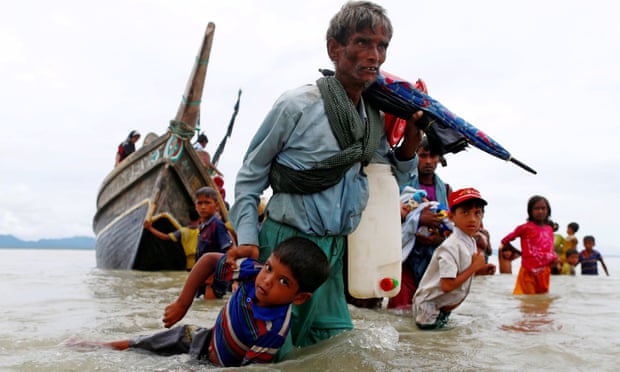 A Rohingya refugee pulls a child as they walk to shore after crossing the Bangladesh-Myanmar border by boat on Sunday. Photograph: Danish Siddiqui/Reuters
A Rohingya refugee pulls a child as they walk to shore after crossing the Bangladesh-Myanmar border by boat on Sunday. Photograph: Danish Siddiqui/Reuters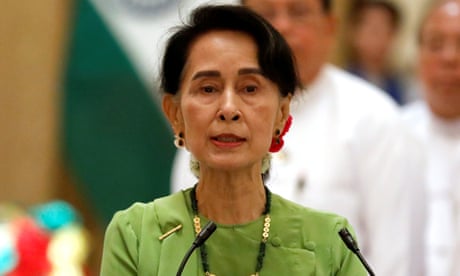
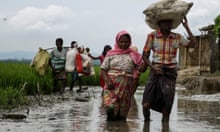
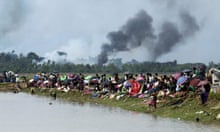
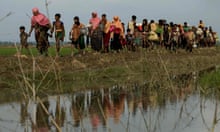
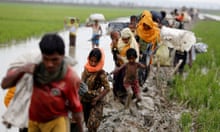



Thousands of Rohingya flee Myanmar amid tales of ethnic cleansing